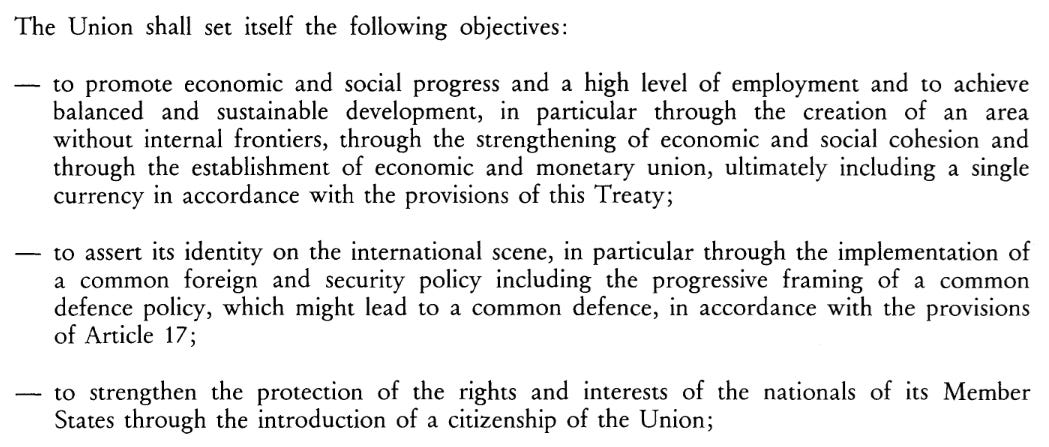NATO Fraud Exposed: Europe Defenceless Without 'US Cavalry'
All my investigations are free to read, thanks to the generosity of my readers. Independent journalism nonetheless requires investment, so if you value this article or any others, please consider sharing, or even becoming a paid subscriber. Your support is always gratefully received, and will never be forgotten. To buy me a coffee or two, please click this link.
On April 23rd, Politico published an extraordinary article, “The US cavalry isn’t coming”, documenting in forensic detail the extent to which European defence planning and infrastructure has for decades been exclusively “built on the assumption of American support,” and “speeding American reinforcements to the frontlines.” Now, “the prospect of that not happening is throwing military mobility plans into disarray,” and the continent “stands alone” - defenceless, directionless, and bereft of solutions to the disastrous results of their prostration to US hegemony over many decades.
The article begins with a subpar stab at fantasy fiction, sketching a nightmare scenario that erupts during March 2030. “In the early spring mist”, a multi-pronged Russian attack commences against Lithuania and Poland, sending foreign soldiers posted there scrambling for cover, as “allied countries rush to respond.” But while Britain, France, Germany, Italy and the Nordics mobilise their militaries for the task, “there is one stark absence”:
“Leaders and soldiers alike look westward, to the ocean, hoping for the warships that have always come to Europe’s rescue over the past century. But the sea offers only silence. The Americans aren’t coming. Donald Trump’s second presidency has ended the United States' commitment to European defense.”
Of course, Trump has not extricated Washington from NATO - yet. “But what happens if America abandons Europe?”, Politico reports, is a troubling question reverberating with ever-increasing urgency throughout Western corridors of power. The answer highlights an “uncomfortable reality” - “without US support, moving troops across Europe would be slower, costlier and hampered by a patchwork of logistical bottlenecks.” In the event of all-out war, these shortcomings “might not just be inefficient”, but “could be fatal”.
Politico goes on to paint a romantic portrait, evoking a Hollywood portrayal of the Normandy landings. It claims that since NATO’s 1949 founding, “one of the key roles of the alliance’s European members has been to resist an invasion while the US gathered its immense power and sent troops, equipment and supplies across the Atlantic to win the longer war.” The outlet notes numerous historic ports were structured to greet Europe’s American saviours, who would then “use roads and rail to head toward the fighting.”
However, “planners never envisioned a NATO without the US, and for decades, Europe’s military logistics have been built on the assumption of American support.” Much of the continent’s transport infrastructure has thus been “shaped by the expectation that US reinforcements would arrive from across the Atlantic,” and “both legacy and new military mobility projects rest on the premise that the Americans will come.” Of course, the obvious question of whether Washington ever intended to actually fulfil that “premise” is not asked by Politico.
‘Independent Fortress’
With the collapse of Communism across the Warsaw Pact in 1989, and the Soviet Union’s reduction to reliable US lickspittle by the rule of Mikhail Gorbachev, European leaders started to think critically about the continued necessity of NATO - a military alliance created to prevent an invasion that never came, now rendered invalid. In 1991, French President François Mitterrand and German Chancellor Helmut Kohl commenced discussions about integrated defence and foreign policy across Europe, with the explicit purpose of reducing US influence over the continent.
Members of the then-European Community signed off on this vision in February 1992, via the historic Maastricht Treaty. France and Germany also began laying the foundations of a pan-European army, dubbed “Eurocorps”. Concurrently, US officials made their visceral disapproval of this new direction abundantly clear. In November 1991, George Bush sternly warned Brussels, “our premise is that the American role in the defense and the affairs of Europe will not be made superfluous by European union.” Meanwhile, a June 1992 Washington Post report recorded:
“Senior German officials say they continue to feel intense US pressure to back off from plans for a European army corps and to make unspecified but apparently unending displays of their commitment to NATO as the supreme mechanism for defending Europe…US officials [are] lobbying smaller European countries to stay out of the developing German-French Eurocorps.”
The rationale for Washington’s bitter opposition was clear, and openly stated. Gabriel Robin, a former French representative to NATO, acknowledged the alliance’s “real function…is to serve as the chaperon of Europe…to prevent [Europe] from establishing itself as an independent fortress and perhaps one day, a rival.” Bush himself acknowledged as much in a speech prior to Maastricht, during which he referred to “the dangers that old Cold War allies will become new economic adversaries - cold warriors turned to trade warriors.”
On top of neutralising potential economic competitors, NATO’s European occupation also ensures member states remain reliable profit sources for US corporations. As the alliance’s former Supreme Commander Alexander Haig acknowledged in January 2002, Washington’s vast troop presence in Germany was necessary not only as it provided “the basis of our influence in the European region,” but “it is also the bona fide of our economic success…it keeps European markets open to us.” Were the US to withdraw, “those markets would probably be more difficult to access.”
That same year, NATO candidate member Bulgaria was informed in no uncertain terms by Bruce Jackson, President of the US committee on NATO, her accession was contingent on privatisation of remaining state-owned industries, and their sale to the ‘right’ overseas buyers. Jackson took up the post after serving as Vice-President of Lockheed Martin, the giant US defence contractor, for almost a decade. In 1977, it was revealed the company had for years bribed foreign governments and leaders to purchase its equipment.
NATO today need not engage in such unabashed corruption to achieve the same end. All its members are obliged to constantly purchase exorbitantly-priced US and British-made weapons systems in the name of “interoperability”, even if the clobber in question isn’t fit for purpose. For example, numerous NATO states have invested voluminous sums in acquiring Lockheed Martin’s “notoriously unreliable” F-35 fighter jet, which has crashed so often even US officials publicly express concerns about its safety.
‘Wrong Conflict’
The devastating legacy of Washington’s deliberate sabotage of Europe’s autonomous military evolution, and the continent’s resultant enforced dependency on NATO, is writ large in the Politico probe. The outlet notes that any discussion of European strategic autonomy occurs “within a system where Washington still controls the core tools of military mobility - the aircraft, ships, fuel lines, satellites, cyber defenses and interoperability standards that hold it all together.” And Europe lacks the infrastructure for “moving troops, tanks and fuel” to any prospective local warzone.
“Heavy transport aircraft, military cargo ships and…specialized vehicles” are required “to move tanks and armored units,” all of which Europe does not possess. Lethally, cessation of US military support would leave NATO members without even “basic loading gear like ramps and flatbed wagons.” Former US Army Europe Commander Ben Hodges tells Politico European infrastructure cannot handle the task of effectively ferrying weapons, equipment, or soldiers. The continent’s existing transport networks are singularly not “designed for large-scale rapid military movements.”
“Weak bridges, sharp curves, narrow tunnels and poorly placed signs make it difficult to move heavy armor quickly by rail - and the roads aren’t much better,” Politico observes. For instance, signage indicating how much weight a bridge can carry has “become rare in many countries,” as “most of today’s infrastructure was never intended for military use.” Elsewhere, air-to-air refueling - “essential in contested airspace” - is an effective US monopoly. Europe’s defense of its eastern flank “relies on American-financed NATO fuel networks stretching across the continent.”
This dependence extends beyond logistics, with Europe also relying on “US intelligence, cyber defenses and hybrid threat detection” to defend its military networks and infrastructure. “If the US pulls back, real-time intelligence and satellite surveillance will be the first to suffer,” a Brussels-based think tank apparatchik tells Politico. Without US cybersecurity capabilities, Europe “would become an easy target for cyberattacks, sabotage” and more besides. And “even with increased investment, Europe would struggle to replace these capabilities.”
Presently, “the only body that arguably holds a full picture of military mobility in Europe” is NATO’s Joint Support and Enabling Command, situated in a German US military base, which “[oversees] routes, choke points and movement planning.” JSEC falls under the authority of NATO’s Supreme Allied Commander Europe, a position always held by Americans, meaning all European military planning again ultimately “runs through Washington.” Politico reports the Trump administration is now “contemplating handing that role to a European for the first time” since NATO’s founding.
For Politico, this move “[underlines] America’s dwindling interest in European defense” - a testament to how “if the Americans don’t ultimately show up” in the event of a war, none of “the corridors, the ports, nor the meticulously crafted logistics” constructed to defend against Russian invasion “may stand a chance.” After all, “the ships and planes they count on could remain parked thousands of miles away.” The outlet concludes by cautioning:
“By investing heavily in a war strategy built on US support that may never materialize, Europe risks preparing for the wrong conflict.”
In a sense, NATO’s constantly growing membership has always been “preparing for the wrong conflict”. The “US cavalry” European countries have been promised for decades would come to their rescue in the event of war was, by design, never going to arrive. On April 24th, The Times quietly reported Britain was not only scrapping plans to deploy troops to Ukraine, but had “always” considered the risk of doing so “too high”, with her forces “inadequate for such a task.”
This followed months of bombastic, bellicose pronouncements from Keir Starmer. He variously declared himself “ready and willing to put British troops in Ukraine,” was prepared for them to remain there “indefinitely”, and would even commit fighter jets to policing the country’s skies. All these undertakings were contingent on US forces providing a “backstop”, which Washington repeatedly made clear wouldn’t happen. If other European leaders have likewise finally woken up to NATO’s reality, then perhaps their fantasies of keeping the conflict grinding on will similarly crumble.





Such an important piece. It should help Spokane, Washington understand its place in post WW2 history — home to Fairchild Air Force Base, for 40 years until 1994 home to nuclear weapons-carrying B-52 bombers and for the last 30 years home-base to more KC-135 aerial refuelers (at last count 69) than anywhere in the world, more than all Europe combined, and more than Russia, China, Saudis Arabia, and India combined. And we in Spokane may understand —if only our propaganda-addled brains would allow— how come our Gonzaga University and its Clinton-pardoned trustee John Hemmingson, combined with Lockheed-Martin and other corrupt warmongering corporations, are now trying to cement Spokane’s blood-soaked history and economy more solidly in this blackmailing weapons-of-war scheme.
Another insiteful piece Kit. You are expressing what those morons masquerading as politicians are fully aware of. Very well articulated, thank you.